Utlizing ‘AI’ Artificial Intelligence Software in the Hospitality Industry
Have you ever wanted more time and more help in your...
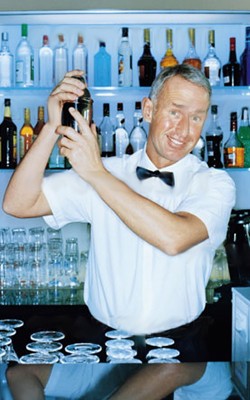
Getting old sucks. Weight flies on at approximately the same speed as hair flies off. New and interesting problems occur in places you’d really rather not think about. Having spent the best part of a decade trying not to have/create babies, you find it’s almost as hard to make ‘em as it was to avoid ‘em. You have to learn to do scary stuff like sign house loans. All your friends move to the suburbs. Your college buddies you out-earned bartending every single year since graduation? They’re finally starting to out-earn you – just at the point where you’ve maxed out the income you can earn from bartending. But the hardest part of all is leaving bartending behind.
Now, I know many of you are Americans, so I’ll type slowly- only joking! What I mean is, America is only of the very few- maybe the only – country where you can earn decent money, as much as in any other amount of jobs, pretty much your whole life long as a bartender. It’s in no way unusual to see 50-year-old bartenders in the States and while they’re maybe not in the top rank of earners, they’re not doing too bad. Elsewhere this ain’t the case. If you see a 50-year-old guy behind the bar it’s either the owner, the manager, or someone who’s got issues, because outside the US you simply do not earn a decent income bartending at that age, in the general run of things. Either the money bartending is bad anyway, or bartenders over the age of 40 or 50 simply do not get hired.
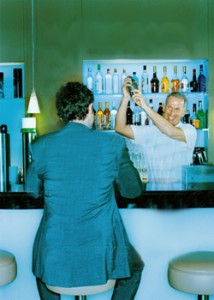 It’s a hard learning curve, and one I traveled myself. As a decent bartender willing to travel to work and learn, you’ll out-earn almost every other profession until you’re about 30. Then you’re maxed-out. All your college buddies who spent years making coffee and taking notes are finally moving up, and here’s the thing: their pay rises will keep coming every year or two until they retire. Bartender income stagnates, and it positively goes backwards as you age. Sure, there are older bartenders in some fancy hotels and a handful of really top-end bars, but they’re the extreme exception.
It’s a hard learning curve, and one I traveled myself. As a decent bartender willing to travel to work and learn, you’ll out-earn almost every other profession until you’re about 30. Then you’re maxed-out. All your college buddies who spent years making coffee and taking notes are finally moving up, and here’s the thing: their pay rises will keep coming every year or two until they retire. Bartender income stagnates, and it positively goes backwards as you age. Sure, there are older bartenders in some fancy hotels and a handful of really top-end bars, but they’re the extreme exception.
So what’s a bartender to do? Well, I’m a consultant. That’s not a fancy name: I am very critical of people who call themselves “bartenders” who don’t pull at least one shift a week behind a bar making drinks for people. It doesn’t matter to me if that bar is one single bar, a bunch of places, or on-location cocktail catering. Making drinks behind a bar for customers is the essence of bartending to me, and since I don’t do it anymore I call myself a consultant, or brand ambassador, or whatever. I feel I’d be insulting real working bartenders if I used the title I once had.
 “Consulting” covers a multitude of sins, but in my case it involves advising drinks firms about how to sell their brands, especially to bartenders and consumers. This can be everything from advising on POS items to writing and executing training programs to designing signature cocktails to writing content for sales sheets and websites, to styling and supervising photoshoots… etc etc. There’s no set work description. For me, because I now have to hire people to do much the same thing for various brands’ distributors around the world, it’s hard to find people who are good at this particular balancing act. They have to be credible, experienced bartenders, with experience and insight in both Flair and mixology and general advanced bartending skills in pretty much every area, plus be able to integrate seamlessly into the fairly uptight 9-5 long-term let’s-have-a-meeting-and-discuss-this world of drinks companies. Schizophrenic but in a nice way is one description. And you can either start a company and sell your services to drinks firms, or actually be hired and salaried and get a job title like Ambassador.
“Consulting” covers a multitude of sins, but in my case it involves advising drinks firms about how to sell their brands, especially to bartenders and consumers. This can be everything from advising on POS items to writing and executing training programs to designing signature cocktails to writing content for sales sheets and websites, to styling and supervising photoshoots… etc etc. There’s no set work description. For me, because I now have to hire people to do much the same thing for various brands’ distributors around the world, it’s hard to find people who are good at this particular balancing act. They have to be credible, experienced bartenders, with experience and insight in both Flair and mixology and general advanced bartending skills in pretty much every area, plus be able to integrate seamlessly into the fairly uptight 9-5 long-term let’s-have-a-meeting-and-discuss-this world of drinks companies. Schizophrenic but in a nice way is one description. And you can either start a company and sell your services to drinks firms, or actually be hired and salaried and get a job title like Ambassador.
Another type of consulting is working for bars, either individual operations or chains or large establishments that include bars like hotels, casinos, restaurant chains and the like. This varies from just training bartenders in some skill they don’t have or want to improve- ranges from very basic bartending up to advanced mixology, Flair, sales techniques, speed and efficiency – right the way up to complete concept-development, and even outsourced management and payrolling. The key to this consulting activity is being allowed to make a discernable difference. If you get hired to do a one-day training in a disorganized laissez-faire type place where things like setup, breakdown, cleaning, beautification, pre-shift meetings and the like are as fantastical as elves and hobbits, you’re being set-up to fail and it’s more than likely it’ll be a one or two-time deal only and because you’re not doing much, you won’t be able to charge much. If you sell in a complete program – define the concept of the place, make a strategy, describe tactics, write job descriptions, hire and train staff, manage the place for a while – all the success factors are under your control and if you fail it’s because you suck. If you succeed, you succeed big and you can invoice accordingly. Hundreds of thousands or even millions of dollars are not unusual: look at Rande Gerber’s Midnight Oil company, for instance.
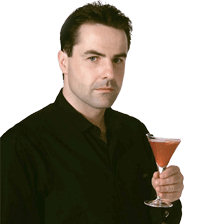 Cocktail catering, or high-class drinks catering, is a no-brainer for a bartender; set-up costs can be very low, and synergies (hire your buddies! get ice from work! score customers at work!) are many. You probably already get guests asking if they can hire you for parties. In my case, catering led to consulting: I did a gig for a drinks firm in 1999 (having scored the gig because someone just called the bar I was working at) and two weeks later I was kicking back in KLM Business Class en route from Amsterdam to Osaka, little knowing it would turn into pretty much a full-time job. Drinks catering can get big: UBS in Germany have around 80 mobile bars and use a full-length articulated juggernaut for larger gigs. But be prepared to either stay very specific or get very general: either be die-hard balls-to-the-wall cocktails, or Flair, or wine, or whatever your twist is, or (if you want to get REALLY big), serve everything excellently, from espresso and wine to cocktails and beer and even smoothies and soft drinks. The most successful businesses I see in this category are ones that emphasize no-hassle superb drinks service of every type of drink.
Cocktail catering, or high-class drinks catering, is a no-brainer for a bartender; set-up costs can be very low, and synergies (hire your buddies! get ice from work! score customers at work!) are many. You probably already get guests asking if they can hire you for parties. In my case, catering led to consulting: I did a gig for a drinks firm in 1999 (having scored the gig because someone just called the bar I was working at) and two weeks later I was kicking back in KLM Business Class en route from Amsterdam to Osaka, little knowing it would turn into pretty much a full-time job. Drinks catering can get big: UBS in Germany have around 80 mobile bars and use a full-length articulated juggernaut for larger gigs. But be prepared to either stay very specific or get very general: either be die-hard balls-to-the-wall cocktails, or Flair, or wine, or whatever your twist is, or (if you want to get REALLY big), serve everything excellently, from espresso and wine to cocktails and beer and even smoothies and soft drinks. The most successful businesses I see in this category are ones that emphasize no-hassle superb drinks service of every type of drink.
Bar management is another career option, but just not a great one. Typically, you lose the chance to make tips and you are expected to work extra hours unpaid. I myself have never heard a decent reason as to why managers should ever be entitled to tips, unless they work an entire shift as a bartender. So why be a manager? Well, it can be a good way to learn a whole bunch about operating a bar, convenient if you want to open your own. You learn about rules and regs and you will learn about cash reporting and handling and the like. There don’t seem to be any good bar management courses yet, so it’s very much hit and miss: probably the best all-round training is to be had in very large chains of hotels, casinos and restaurants. In my experience bar management is usually a stepping-stone to more lucrative possibilities like becoming a general manager or opening your own place.
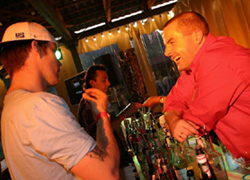 Ah yes, opening your own place. Better people than me have written about it, which isn’t hard because, you see, I’ve never opened my own place with my own cash. It’s a totally different ballgame when it’s your money on the line. And here’s the thing. Bars (and restaurants, and clubs…) are all just retail businesses. That’s all they are. There’s no mystique about the hospitality business: make the shop look nice, treat your customers well, stock a good range of interesting products and they’ll buy more and/or return more frequently. Like any kind of retail, the margins are slim: typically between 8 and 15% of turnover is profit, and you’re unlikely to hit this in the first year or two. And yes, of course your bar will be different: you’ll have reps lining up to hand over listing fees in cash in brown envelopes and you know this guy who’ll set you up with an awesome sound system for cost and… and… and you’ll still be lucky to hit 8-15%. So why do it? Real estate. Get a good deal on buying or leasing a location and the value of the building/lease will climb faster and higher if you make the bar a success than for almost any other reason. In some major cities, this is why property developers give bars a break on the rent, or even make it free. I know several well-known bars which are actually loss-making but scrape by on listing fees and occasional subsidies from the building owner, because a successful bar keeps the value of the building rising year-on-year-on-year. If you want to make money in the bar business, you’ll need more than one outlet, probably between 3 and 5. That’s the level at which economies of scale kick in: you can hire a full-time accountant, office manager, you’ve got staff flexibility, you can negotiate better deals on purchasing. The hardest part is opening bar 2. Oh, and if you didn’t already know it: don’t try to be friends with your staff. Doesn’t work. Friendly relationship, yes. Friends, no. If you want a friend, get a dog.
Ah yes, opening your own place. Better people than me have written about it, which isn’t hard because, you see, I’ve never opened my own place with my own cash. It’s a totally different ballgame when it’s your money on the line. And here’s the thing. Bars (and restaurants, and clubs…) are all just retail businesses. That’s all they are. There’s no mystique about the hospitality business: make the shop look nice, treat your customers well, stock a good range of interesting products and they’ll buy more and/or return more frequently. Like any kind of retail, the margins are slim: typically between 8 and 15% of turnover is profit, and you’re unlikely to hit this in the first year or two. And yes, of course your bar will be different: you’ll have reps lining up to hand over listing fees in cash in brown envelopes and you know this guy who’ll set you up with an awesome sound system for cost and… and… and you’ll still be lucky to hit 8-15%. So why do it? Real estate. Get a good deal on buying or leasing a location and the value of the building/lease will climb faster and higher if you make the bar a success than for almost any other reason. In some major cities, this is why property developers give bars a break on the rent, or even make it free. I know several well-known bars which are actually loss-making but scrape by on listing fees and occasional subsidies from the building owner, because a successful bar keeps the value of the building rising year-on-year-on-year. If you want to make money in the bar business, you’ll need more than one outlet, probably between 3 and 5. That’s the level at which economies of scale kick in: you can hire a full-time accountant, office manager, you’ve got staff flexibility, you can negotiate better deals on purchasing. The hardest part is opening bar 2. Oh, and if you didn’t already know it: don’t try to be friends with your staff. Doesn’t work. Friendly relationship, yes. Friends, no. If you want a friend, get a dog.
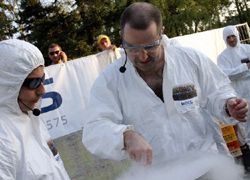 Then there’s turning gamekeeper: going to work for a drinks firm. Usually this has elements of being a consultant in the sense that you can do more things like trainings than a regular sales guy. Many times you’ll be hired because you’re a well-known bartender, and you’ll be expected to create and maintain contacts with bars that the firm want to sell, or sell more, to. In this job, as in any other, the trick is to move onward and upward. Sales promoter to sales rep, sales rep to area manager, area manager to… well, you see the route. It’s also possible to move from sales into marketing, if that’s your bag.
Then there’s turning gamekeeper: going to work for a drinks firm. Usually this has elements of being a consultant in the sense that you can do more things like trainings than a regular sales guy. Many times you’ll be hired because you’re a well-known bartender, and you’ll be expected to create and maintain contacts with bars that the firm want to sell, or sell more, to. In this job, as in any other, the trick is to move onward and upward. Sales promoter to sales rep, sales rep to area manager, area manager to… well, you see the route. It’s also possible to move from sales into marketing, if that’s your bag.
Or……….there’s something completely different. The skills you can learn as a bartender can serve you very well in any amount of other careers. Being able to listen actively, speak in front of crowds, defuse or lighten up situations, sell, work in a team, deal with high-pressured situations, and so forth. I know several bartenders who became stockbrokers, and many more who moved effortlessly into fields such as PR, media, marketing, advertising, and sales. If you’ve saved your money, you can survive initial training costs and entry-level income to eventually come out earning more than you ever could bartending.
And now we come to the dilemma of the dog chasing the car: what does he do when he catches it? What do you do when you stop being a bartender? No more regular shifts. Available in the evenings, even at the weekends, even on a Saturday or New Year’s Eve, by God! You’ll discover how much you suck at dancing, which you never had time for, or need of, before – because you could pick up all the babes/guys you wanted just by standing behind the wood. The first few weeks and months are fine, everyone remembers you, free entry and drinks, you get treated like a king. But you begin to realize in a lot of cases the bars you visited are far more fun to work in than as a guest. You begin to be annoyed at things that never annoyed you before: music too loud, service too slow. You’re getting old, dude, that was one of the reasons you stopped in the first place.
Day by day, week by week, year by year, the places you used to work at lose their shine and colleagues you used to work with stop bartending as well. You have to work your ass off to stay in the loop, stay in touch: it’s easier if you’re still peripherally attached to the business as a consultant or caterer. But, guaranteed, 5 years after you were top dog at Bar X, saying you used to be top dog at Bar X has 10 times less impact than it did then. New bars and bartenders come along. To paraphrase Bill Long, it’s hard to get used to being a has-been. Oh, and your Flair? It withers away and dies, leaving just some knobby stumps of safe working Flair behind. Everyone loses it. Everyone.
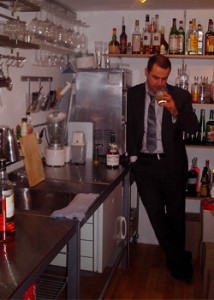 And me? I’m heavier than I’d like and buzz-cutting my hair hides the bald patch. I have a house in the suburbs and I drive a sedan. I earn more, for my age, than anyone has a right to expect, and certainly far more than my training and experience would suggest (I’m a university graduate in Marketing and French). I stopped bartending about 3.5 years ago (having bartended for 17 years) and my job keeps me reasonably up to date – but I have to work at it. No more free rides. Like any job, I make a conscious effort to keep up to date and keep learning: since January I’ve become a Dutch-government-certified catering -trades trainer (extremely cool program leaning on NLP), passed the London-based WSET Professional Certificate in Spirits with distinction (in my opinion, the single best spirits-training course in the world), and I’m off to NY in two days to complete the TIPS trainer-training program. Since a month or two ago, I’ll never have to put another dime into my retirement plan and still be able to retire comfy at 55. I write my own schedule and choose my own projects, but if you want to serve your clients well and do your job decently, that’s less flexibility than you’d think.
And me? I’m heavier than I’d like and buzz-cutting my hair hides the bald patch. I have a house in the suburbs and I drive a sedan. I earn more, for my age, than anyone has a right to expect, and certainly far more than my training and experience would suggest (I’m a university graduate in Marketing and French). I stopped bartending about 3.5 years ago (having bartended for 17 years) and my job keeps me reasonably up to date – but I have to work at it. No more free rides. Like any job, I make a conscious effort to keep up to date and keep learning: since January I’ve become a Dutch-government-certified catering -trades trainer (extremely cool program leaning on NLP), passed the London-based WSET Professional Certificate in Spirits with distinction (in my opinion, the single best spirits-training course in the world), and I’m off to NY in two days to complete the TIPS trainer-training program. Since a month or two ago, I’ll never have to put another dime into my retirement plan and still be able to retire comfy at 55. I write my own schedule and choose my own projects, but if you want to serve your clients well and do your job decently, that’s less flexibility than you’d think.
But just so you know, I have a tricked out bar at home. More than 300 bottles, some of them worth a thousand bucks each, a professional-grade distilling set-up, a brand-new Hoshizaki ice machine that makes solid cubes 28mmx28mmx32mm, stainless steel worktables and sinks, a freezer and all the toys you can imagine. It’s not over.
Have you ever wanted more time and more help in your...
MANGO MAGIC: Marco Estrada, Brownsville, TX 1 ½ oz Aviation Gin ¾...
ALOE WOK: Olya Sabanina, Saint Petersburg, Russia 1 1/3 oz Aviation Gin...
We have all strived to become better at our craft, or else,...
About the author, Elton Marvin Jr. has worked in the food and...
From starting out picking up a Flairco bottle after watching the movie...
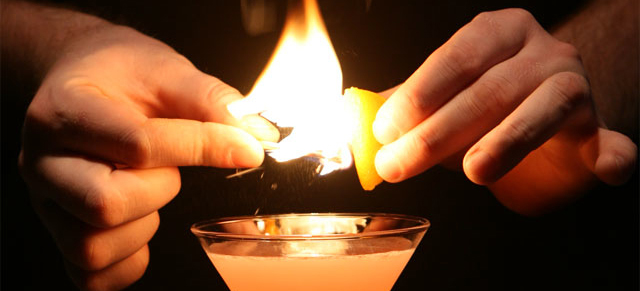
Your cart is empty.
Click “Play” on the video above.
Click “Play” on the video above.
Click “Play” on the video above.


android
September 19, 2016 at 7:18 am
Pretty good post. I just stumbled upon your blog and wanted to say that I have really enyed reading your blog posts. Any way I’ll be subscribing to your feed and I hope you post again soon
Jeff Brown
September 5, 2016 at 11:12 am
Greetings,
Thanks for the article. Especially the first paragraph. I’ve been bartending in San Francisco since 1992 and have been thinking of shedding the golden handcuffs. I found your experience and article useful. I would like to extend an invitation to you. Please, the next time you are in San Francisco give me a heads up. I’d like to take you out in my town, show you around and pick your brain.
Thanks again,
Jeff Brown